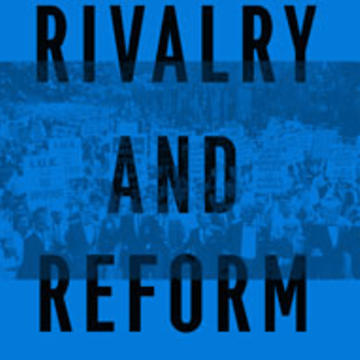Building a Movement Party
The alliance between Ronald Reagan and the new Christian Right
Adapted from Chapter Six of Rivalry and Reform, by Sidney M. Milkis and Daniel J. Tichenor
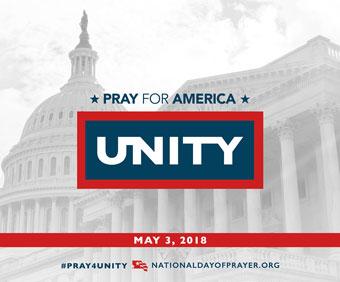
The bond between Ronald Reagan and the new Christian Right was cemented before more than twenty-five hundred conservative evangelical pastors from forty-one states gathered in Dallas on August 21, 1980, for the National Affairs Briefing Conference. One year earlier, Campus Crusade for Christ’s Bill Bright convened a Dallas meeting of prominent conservative evangelicals focused on the twin threats of Soviet communism and national moral degeneration. Billy Graham dramatically declared at the meeting that if there were not a major “philosophical change of principle,” then the United States had “a thousand days of freedom” left.
Highlights from the 1980 National Affairs Briefing Conference
Although critical of the Carter administration behind closed doors, Graham, Rex Humbard, and other evangelical old guard leaders avoided the political fray in 1980. But younger evangelical leaders in attendance, including Bright, James Robison, and Pat Robertson, resolved to organize a pastors’ conference during the presidential election to evaluate candidates and “to mobilize the churches to get people out to register to vote.” The National Affairs Briefings Conference a year later gave voice to these younger and more politically active evangelical leaders; Robison and Religious Roundtable’s Ed McAteer organized the August 1980 program. One young Southern Baptist pastor who worked for Robison—none other than future Arkansas governor and GOP presidential candidate Mike Huckabee—coordinated logistics for the rally.
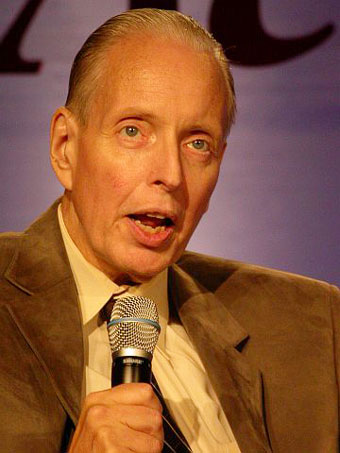
Conference speakers featured a who’s who of New Right and Christian Right politics, including Robertson, Robison, Jerry Falwell, Paul Weyrich, Phyllis Schlafly, and Tim LaHaye. Old guard evangelicals like Graham, Oral Roberts, Rex Humbard, and Robert Schuller kept their distance. “If I backed a Republican for president,” Humbard later asked, “what about the Democrats in my audience?” Carter and third-party candidate John Anderson also declined to address the Dallas gathering when their campaigns learned the conservative tilt of the gathering. Yet the Reagan team, as expected, enthusiastically agreed to have their candidate provide the conference’s keynote address.
As roughly sixteen thousand conservative evangelical pastors and lay leaders filled Reunion Arena in Dallas, Robison and John Connally picked up Reagan at the airport to brief him before his address. During the ride, Robison explained that his evangelical gathering was officially nonpartisan and thus could not endorse Reagan. “I told him that . . . it would probably be wise if his opening comment would be, ‘I know this is non-partisan, so you can’t endorse me, but I want you to know that I endorse you,’ ” Robison recounts. “Oh he loved that. He wrote that down and said, ‘That’s great. I’m going to use it.’ ”
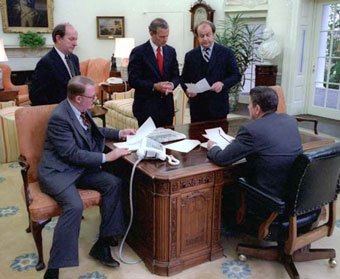
At a press conference prior to his address, Reagan told reporters that the biblical story of creation should be taught in public schools as prominently as the theory of evolution. Robison was slated to offer a speech to the evangelical crowd just prior to Reagan’s, and Connally encouraged Reagan to “go out and sit on the platform” to signal his support to the audience. Knowing of Robison’s fiery rhetoric, campaign aides Michael Deaver and Ed Meese urged Reagan to wait offstage, but he instead marched onto the platform and sat behind Robison. “We’ll either have a Hitler-type takeover, or Soviet dominion, or God is going to take over this country,” Robison bellowed. “It is time to crawl out from under the pews and stop looking through the stained-glass windows. . . . We can turn to God or bring down the curtain. We can sound the charge or play taps.” Arizona’s conservative evangelical senator, John Conlan, was in attendance backstage and recounts that Deaver and Meese “were cringing and saying, ‘Where the heck did this guy come from?’ ” But their candidate had a very different reaction. When Robison’s speech assailed communists, homosexuals, liberal politicians, and other threats to the traditional family, Reagan nodded and applauded enthusiastically from the dais.
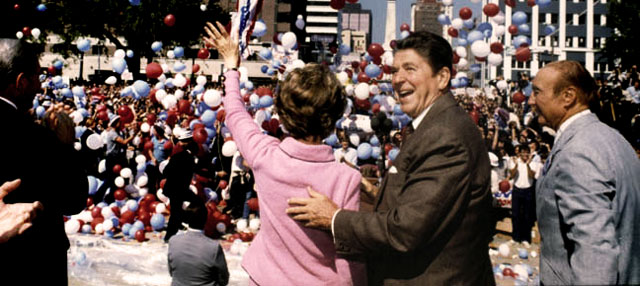
When Reagan was introduced to deliver his own speech, he was greeted with thunderous applause. On cue from his private meeting with Robison and Connally, Reagan’s first line would be the most memorable and oft-quoted of his Dallas address: “I know this is nonpartisan, so you can’t endorse me, but I want you to know that I endorse you!” These words elicited a rapturous standing ovation from the sixteen thousand conservative evangelicals in attendance. Reagan’s speech further electrified the crowd by familiarly railing against plans to “force all tax-exempt schools—including church schools—to abide by affirmative action orders drawn up by—who else?—IRS bureaucrats.” It was an explicit declaration of support for white evangelical private schools that critics called “segregation academies.” He also told the assembled pastors and lay leaders that if he were shipwrecked and could read only one book the rest of his life, he would choose the Bible because “all the complex questions facing us at home and abroad have their answer in that single book.” To explosive applause, he closed by urging conservative Christians to mobilize: “If you do not speak your mind and cast your ballots, then who will . . . vote to protect the American family and respect its interests in the formulations of public policy?” Reagan was now the unquestioned darling of the Christian Right, and Falwell pledged that the Moral Majority would get Christian Right voters to elect Reagan “even if he has the devil running with him.”
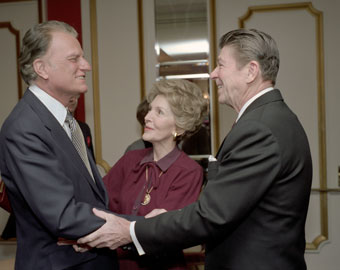
For conservative evangelicals who largely resided at the margins of American politics for decades, Reagan’s message was more than rhetorical flourish. His words signified unprecedented political recognition and legitimation from a major party’s presidential candidate in the modern era. “I don’t think people understand that the average fundamentalist felt alienated from the mainstream of American culture,” Ed Dobson explained. “That was a significant moment, because the candidate came to us; we didn’t go to the candidate.” The Southern Baptist Convention’s Richard Land described both the Dallas conference and Reagan’s speech as “a transformative moment” when “the evangelical involvement in public policy” came of age. Other observers described the mutual embrace of Reagan and conservative evangelicals in Dallas as nothing short of a “marriage ceremony between Southern Baptists and the Republican Party.”
